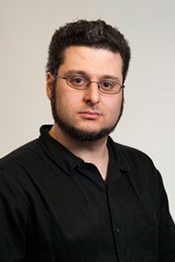Eugene Vasserman | Associate Professor
 Director of the Center for Cybersecurity and Trustworthy Systems
Director of the Center for Cybersecurity and Trustworthy Systems
Ph.D. - 2010, University of Minnesota
Computer Science
M.S. - 2008, University of Minnesota
Computer Science
B.S. - 2003, University of Minnesota
Biochemistry, Neuroscience
Contact information
2171 Engineering Hall
eyv@k-state.edu
Personal Website
Professional experience
Eugene Vasserman received a bachelor’s degree in biochemistry and neuroscience with a computer science minor from the University of Minnesota in 2003. He received a master’s degree in computer science in 2008 and a doctorate in 2010, also from the University of Minnesota. Following graduation, he joined the (then) Department of Computing and Information Sciences at Kansas State University as an assistant professor. He was promoted to associate professor in the now-renamed Department of Computer Science in 2016. He is the director of the university Center for Cybersecurity and Trustworthy Systems, designated as a National Center of Academic Excellence in Cybersecurity Research.
Research
Vasserman’s research is chiefly in the area of security for cyber-physical systems (including systems or medical devices), trustworthy machine learning and AI, security usability, and cybersecurity education. His past work spans the gamut from security vulnerabilities emergent from the routing infrastructure of the internet, to energy depletion attacks in low-power systems, to non-invasive control-flow monitoring in embedded systems, to secure hyper-local social networking, to privacy and censorship resistance at a global scale (systems capable of supporting up to a 100 billion users). Vasserman and his co-authors were the first to introduce and formalize membership concealment as a security property, showed that it is a requirement for effective censorship resistance, and proposed the first membership-concealing network design.
Vasserman’s work and research interests are deeply cross-cutting, and he has collaborated extensively with researchers in physics, psychology, criminology, agronomy, medicine, electrical engineering and, of course, computer science.
Research keywords
Cybersecurity, security, safety, privacy, trustworthy AI, distributed systems, cyber-physical systems (CPS), internet of things (IoT), usability, education
Academic highlights
Vasserman has (co-)authored more than 50 papers appearing in top journals and competitive conferences, has over 1800 citations, an h-index of 19 and i10-index of 30 (as reported by Google Scholar). He has received numerous competitive research grants throughout his career, both as primary and co-investigator, including the prestigious National Science Foundation CAREER award in 2013.
Vasserman has a strong record of academic service, having served on numerous program committees for top conferences and reviewed for prestigious journals. He has contributed to multiple international standards, including UL 2900 (Software Cybersecurity for Network-Connectable Products), the AAMI interoperability working group, and ANSI / AAMI / UL 2800 (Standard for Medical Device Interoperability) where he chaired the cybersecurity task group. Closer to home, Vasserman leads the Cybersecurity major, serves on numerous departmental committees, and is the faculty adviser for the Cyber Defense Club competition team.